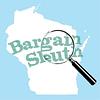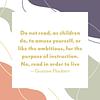You need to sign in or sign up before continuing.
Take a photo of a barcode or cover
51 reviews for:
Class Clown: The Memoirs of a Professional Wiseass—How I Went 77 Years Without Growing Up
Dave Barry, Dave Barry
51 reviews for:
Class Clown: The Memoirs of a Professional Wiseass—How I Went 77 Years Without Growing Up
Dave Barry, Dave Barry
funny
medium-paced
This memoir encompasses everything we’ve come to know and love about Dave Barry’s writing. Rich with his dry wit and self-deprecating humor, he tells the story of his life and career with his signature style and a surprising amount of poignancy. While I imagine many Boomers and elder Gen-Xers will feel nostalgia reading about his column, this Millennial thoroughly enjoyed her time reading this memoir.
emotional
funny
hopeful
reflective
relaxing
medium-paced
“It’s gonna be OK.” —Dave Barry
This memoir gave me all the feelings and I laughed out loud many times. Perfect timing for this book—loved it!
This memoir gave me all the feelings and I laughed out loud many times. Perfect timing for this book—loved it!
Thanks to NetGalley and Simon & Schuster for the digital copy of this book; I am leaving this review voluntarily.
Back in the old days (1980s and 1990s), I used to read the newspaper. And one of my favorite syndicated columnists was Dave Barry. I was so pleased to see he wrote a sort-of memoir. And his humor is still intact! This is a light-hearted, self-deprecating look back on his life and work, but not an official “memoir” in the strictest sense.
Barry recounts his life as a journalist and columnist for the Miami Herald, starting at a relatively young age. Some of his writing will make you laugh out loud, he’s that good, and it shows how he maintained the role of columnist for 30 years. He was syndicated in 500 newspapers at his peak.
The author’s personal life is not all sunshine and full of laughs, though. His clergy father was an alcoholic, and later on, his mother committed suicide. As a child of an alcoholic, I, too, always chose laughter because things were not so great at home. The originality and rawness of his feelings in the first chapter alone is worth the price of admission.
For the rest of the book, Barry recounts some of his favorite columns and expands on them, telling us why they were some of his favorites and quoting from them. It brings me back in time when newspapers were so important to communities, when columnists like Dave Barry and Erma Bombeck were part of the fabric of newspapers across the country, providing respite from the doom and gloom from the front page.
The coolest thing about Dave Barry is that he is in a band with other authors, the most famous of them being Stephen King. A bunch of Boomer authors unwind by playing music together. How cool is that?
This book gets an extra star from me for the pure nostalgia.
informative
lighthearted
relaxing
medium-paced
emotional
funny
informative
lighthearted
reflective
relaxing
sad
medium-paced
I grew up reading Dave Barry in the Miami Herald, which is probably the only reason I read a newspaper. I started reading his books and was hooked. I love the humor he brings to everything. Getting to read this biography was like sitting down with an old friend.
I'm going to keep my review Short And Sweet. I recommend this Book to all who enjoy a Good Laugh and a Good Story.
Thank you to NetGalley and The Publishers for a digital ARC in exchange for an honest review.
funny
informative
lighthearted
reflective
fast-paced
funny
inspiring
fast-paced
emotional
funny
informative
lighthearted
reflective
medium-paced
This originally appeared at The Irresponsible Reader.
---
---
What’s Class Clown About?
It’s really all there in the subtitle: it’s Dave Barry’s memoirs about his career as a professional wiseass—primarily through his humor column, but he’s found other outlets for it, too.
Here’s some of the jacket copy to help beef that up:
America’s most beloved wiseass finally tells his life story with all the humor you’d expect from a man who made a career out of making fun of pretty much everything.
How does the son of a Presbyterian minister wind up winning a Pulitzer Prize for writing a wildly inaccurate newspaper column read by millions of people?
In Class Clown, Dave Barry takes us on a hilarious ride, starting with a childhood largely spent throwing rocks for entertainment—there was no internet—and preparing for nuclear war by hiding under a classroom desk. After literally getting elected class clown in high school, he went to college, where, as an English major, he read snippets of great literature when he was not busy playing in a rock band (it was the sixties).
He began his journalism career at a small-town Pennsylvania newspaper where he learned the most important rule of local journalism: never confuse a goose with a duck. His journey then took a detour into the business world, where as a writing consultant he spent years trying, with limited success, to get corporate folks to, for God’s sake, get the point. Somehow from there he wound up as a humor columnist for The Miami Herald, where his boss was a wild man who encouraged him to write about anything that struck him as amusing and to never worry about alienating anyone…
Class Clown isn’t just a memoir; it’s a vibrant celebration of a life rich with humor, absurdity, joy, and sadness. Dave says the most important wisdom imparted by his Midwestern parents was never to take anything too seriously. This laughter-filled book is proof that he learned that lesson well.
His Origin Story
The first four chapters are the most autobiographical part of the book—a little less than 50% of it. Here we cover his parents, his childhood, schooling, and early career—from his first newspaper job, his detour through business education, and then finding his way back to journalism and becoming a humor columnist.
This is all the nitty-gritty stuff—what were his parents like? (nothing like you’d guess) What did his childhood entail? (bad jokes and throwing things) What did he write before making money with booger jokes? And so on.
This was the more educational—in a good way, I stress—part. He wrote about is parents, in particular, with warmth and humanity. He was open about some of their struggles, but with sensitivity. I really appreciated the way he talked about his marriages—past and present—very briefly, yet definitively. There is some humor, but it’s largely self-directed, or at the culture he and his parents were in.
This is really the kind of thing you come to a memoir for, and Barry did it well. He quotes some of his more serious (and some of his less-serious) columns here to show what he’s said about these things in the past.
Topical Memories
A little over half the book is devoted to what I’m describing as “Topical Memories”—he has a chapter on things like “My Readers,” “Politics,” and “Books, Music, and Movies.” In these, he relates a collection of stories and anecdotes from all over his career along these lines.
So we get stories about the great things his readers have sent him—and some of the less positive things they’ve said. Scandals he created—inadvertently or not. How he was involved in Obama’s first inaugural parade, or had Bruce Springsteen sing backup for him, how he accidentally offended an audience of Russians by screening one of his films. I particularly enjoyed him talking about his feud with his Neil Diamond-loving readers (I’m a pretty big Diamond fan, but thought Barry’s jokes were good and deserved, for what it’s worth)
There are several extended quotations from his columns here—and we get a lot of the stories behind the columns, too. Not the nuts-and-bolts of how he wrote them, but what led to them.
If the Origin Story chapters were educational—this was recess. Just a lot of fun and goofing off, telling wild stories and recounting past glories (and blunders). It was exactly the kind of thing that Barry readers pick up his books for.
The Appendix
I don’t frequently talk about appendices; they’re supplemental material, and I prefer to focus on the main portion of the book, but every now and then, one comes along that demands attention.
For example (as you might have guessed), this appendix. It was a hoot—its title is “A Good Name for a Rock Band.” Barry (like many of us) will frequently pick up on a phrase from something he quoted and say it would be a good name for a rock band (also known by the super-easy and memorable acronym WBAGNFARB). After discussing this practice a bit, Barry gives a non-exhaustive, but extensive list of some of those bands.
I think reading them in context is best—but you definitely can appreciate them in a different way with no context whatsoever. They are definitely more ridiculous that way.
It’s worth picking the book up from the shelf at your local bookstore/library just to read those few pages. (Of course, you’d be better served by reading the whole thing). Even people who don’t have a background with Barry will find some laughs there.
So, what did I think about Class Clown?
I’m fairly certain at this point in my life that I’m hardwired to enjoy Davy Barry’s writing, and that I don’t have the neuroplasticity to change that. No matter what apps for seniors I try. So maybe take this with a softball-sized grain of salt.
I really enjoyed this book. A lot—and on several levels.
Part of me would’ve liked a little more depth, a little more digging into details of his life, maybe his approach to writing. But it’d just feel strange knowing that much about Barry—and we all know what happens to a joke when you dissect it, knowing too much about how his sausage is made might not be that entertaining. Really, for Dave Barry—this is about as deep as we want. Every time I started to say “I wish he’d given us more about X,” I stopped myself and realized that no, this was just the right amount.
So no, it’s not as self-revealing as say, Patrick Stewart’s or Matthew Perry’s books—and that’s good.
This is a great way to get to know Barry a little better—given the nature of his work, a lot of us have had a para-social relationship with him before that was a phrase people used. It’s nice for us to deepen that relationship to a degree—before we get back to jokes about exploding cows, questionable song lyrics, or whatever.
I heartily encourage readers of Dave Barry to pick this up—even casual readers will have fun with this, you don’t have to be a die-hard like me. He’s one of a kind, and it’s great to bask in that for a little while.
Disclaimer: I received this eARC from Simon & Schuster via NetGalley in exchange for this post which contains my honest opinion—thanks to both for this.
funny
informative
lighthearted
fast-paced
CLASS CLOWN: THE MEMOIRS OF A PROFESSIONAL WISEASS: HOW I WENT 77 YEARS WITHOUT GROWING UP* is longtime Miami Herald columnist and author Dave Barry's autobiography and it doesn't disappoint. Oh, and don't forget that 1988 Pulitzer Prize he won for commentary!
I have long been a fan of Barry's because his brand of humor fits well with my own, though I recognize that is NOT true for all people. In this memoir he recounts his life from childhood to semi-retirement with characteristic insight, ability to spot irony, and long-standing commitment to booger jokes. It's total fun!
Here's a chance to find out how Barry's quite successful career depended at least some on unexpected moments of good fortune. Like an unlikely invitation to appear on the Tonight Show with Johnny Carson. Or longstanding membership in a not-very-good band made up of fellow writers. Or being assigned to cover a presidential campaign.(!)
There's also the story of how his 30 years writing humor columns for a newspaper morphed into writing a surprisingly long list of non-fiction, fiction and young adult books. Not to mention a TV series sort of based on his life, Dave's World (1993-97).
Amid the humor (with wonderful supporting photos) he comes across not just as a funny writer, but also as a decent guy. When he writes about more serious or painful aspects of his life, they are handled concisely and with sensitivity. Like his father's alcoholism, his mother's suicide, and his first two failed marriages.
What came as the biggest surprise to me was his final chapter, where Barry shares some of his life lessons from his nearly eight decades. There's actual wisdom to be had!
While I highly recommended CLASS CLOWN for all, it's an absolute MUST for Baby Boomers since Barry too remembers that generation's shared foundational experiences - like Howdy Doody, Lassie, and Sputnik!
I have long been a fan of Barry's because his brand of humor fits well with my own, though I recognize that is NOT true for all people. In this memoir he recounts his life from childhood to semi-retirement with characteristic insight, ability to spot irony, and long-standing commitment to booger jokes. It's total fun!
Here's a chance to find out how Barry's quite successful career depended at least some on unexpected moments of good fortune. Like an unlikely invitation to appear on the Tonight Show with Johnny Carson. Or longstanding membership in a not-very-good band made up of fellow writers. Or being assigned to cover a presidential campaign.(!)
There's also the story of how his 30 years writing humor columns for a newspaper morphed into writing a surprisingly long list of non-fiction, fiction and young adult books. Not to mention a TV series sort of based on his life, Dave's World (1993-97).
Amid the humor (with wonderful supporting photos) he comes across not just as a funny writer, but also as a decent guy. When he writes about more serious or painful aspects of his life, they are handled concisely and with sensitivity. Like his father's alcoholism, his mother's suicide, and his first two failed marriages.
What came as the biggest surprise to me was his final chapter, where Barry shares some of his life lessons from his nearly eight decades. There's actual wisdom to be had!
While I highly recommended CLASS CLOWN for all, it's an absolute MUST for Baby Boomers since Barry too remembers that generation's shared foundational experiences - like Howdy Doody, Lassie, and Sputnik!








